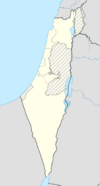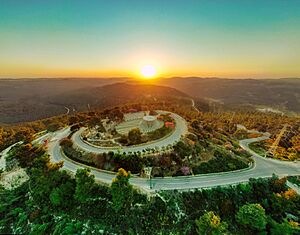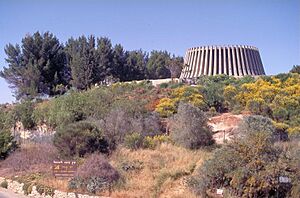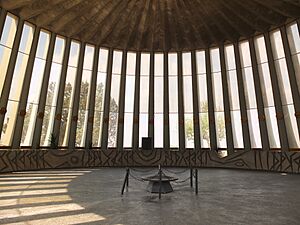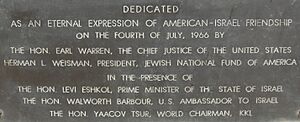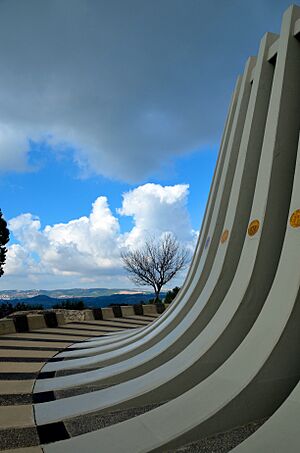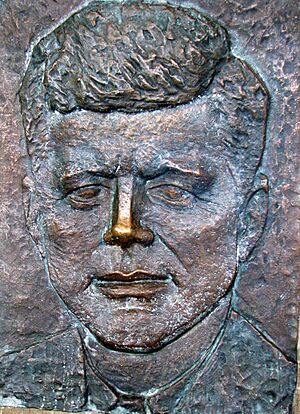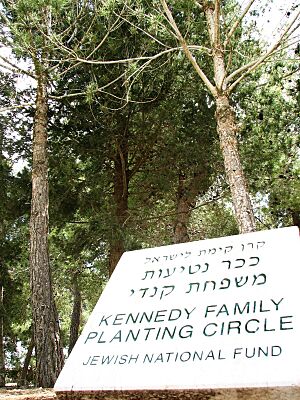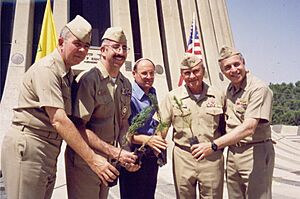Yad Kennedy facts for kids
| Yad Kennedy | |
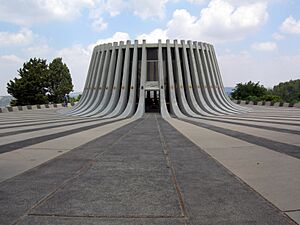
Yad Kennedy (John F. Kennedy Memorial)
|
|
| Coordinates | 31°44′56.69″N 35°8′4.98″E / 31.7490806°N 35.1347167°E |
|---|---|
| Location | Mateh Yehuda Region near Jerusalem |
| Designer | Architect David Resnick with sculptor Dov Feigin |
| Material | Concrete and glass |
| Height | 60 ft (18 m) |
| Beginning date | 1965 |
| Completion date | 1966 |
| Opening date | 4 July 1966 |
| Dedicated to | John F. Kennedy |
| Internal area includes bust of Kennedy, eternal light, memorial wall inscribed with excerpts of Kennedy's speeches, and library of photographs and documents related to US-Israel relations until time of Kennedy's death | |
Yad Kennedy (Hebrew: יד קנדי, Kennedy Memorial) is a special place in the Mateh Yehuda Region near Jerusalem. It honors John F. Kennedy, who was the 35th President of the United States. He was sadly killed in Dallas, Texas in 1963.
The memorial is 60-foot high (18 m) and looks like the stump of a tree that was cut down. This shape shows that a life was ended too soon. Inside, you'll find a bronze picture of Kennedy and a flame that burns forever. The memorial is surrounded by 51 concrete columns. There's one column for each of the 50 states in the United States and one for Washington, D.C., the nation's capital. Each column has the symbol of its state or district. Thin glass panels separate the columns. The monument is about 250 feet (76 m) around its base and can hold about 100 visitors at a time. It was built in 1966 with money given by Jewish communities in America.
Yad Kennedy and its nearby picnic areas are part of the John F. Kennedy Peace Forest.
Contents
What Does "Yad" Mean?
The word yad (pronounced "yahd") is Hebrew. It means "memorial" or "hand." It is used for several memorials in Israel, like the famous Holocaust museum Yad Vashem. The word comes from an old book called the Book of Isaiah in the Bible. It talks about giving a "memorial and a name" (yad vashem) in a special place.
Where Is Yad Kennedy Located?
The memorial is about 7 miles (11 km) from downtown Jerusalem. It sits on top of one of the highest Jerusalem hills, about 825 metres (2,707 ft) high. From the site, you can see the historic area of Betar. This was once a strong fort during a Jewish revolt against the Romans long ago.
Visitors often say the view from the parking lot is amazing. You can see many mountains and valleys. On a clear day, you might even see the Mediterranean Sea towards Tel Aviv, which is 40 miles (64 km) away. You can reach the memorial by driving on winding mountain roads past Ora and Aminadav. It's a bit of a walk from the closest bus stop, so many groups visit by special tour buses.
The monument and its picnic areas are part of the John F. Kennedy Peace Forest. This forest is part of a larger forest called "Aminadav Forest," which covers a huge area of 7,000 dunams in Ein Kerem.
How Was Yad Kennedy Built?
The idea for the memorial came from Max Bressler in 1964. He was the president of the American Jewish National Fund. Sadly, he passed away in 1966 before the dedication.
Raising Money for the Memorial
In January 1964, plans for the memorial were announced. Committees were set up in each U.S. state and in other countries to raise money. On November 22, 1964, the first anniversary of President Kennedy's death, special meetings were held across the United States. These meetings honored the President and celebrated the upcoming memorial.
American communities also promised to pay for trees to be planted in the forest, in addition to donating money for the memorial itself. For example, in 1965, the city of Los Angeles, California, pledged to plant 100,000 trees!
Dedication Ceremony
Almost 2,000 people attended the dedication ceremony on July 4, 1966. This included officials from Israel and the United States, tourists, students, and many Israelis.
An Israeli children's band played both the Israeli national anthem, Hatikva, and the U.S. anthem, the Star Spangled Banner. News reports said the children played slowly but bravely, and soon many strong voices from the crowd joined in.
Important guests included U.S. Chief Justice Earl Warren, who had investigated Kennedy's death. Also there were Levi Eshkol, the Prime Minister of Israel, Teddy Kollek, the mayor of Jerusalem, and Walworth Barbour, the United States Ambassador to Israel.
Chief Justice Warren spoke about the memorial. He said it was special because it was dedicated on American Independence Day, but also honored the independence of Israel and other free nations. He felt that the forest, as a "living memorial," would have made Kennedy very happy. Kennedy himself had spoken about the importance of planting trees in Israel years before.
Israeli Prime Minister Eshkol said that Kennedy's memory would live on. He called Kennedy a friend of Israel and a symbol of great ideals for all people. The American ambassador, Walworth Barbour, added that by honoring Kennedy, the Jewish National Fund honored themselves.
Jacob Tsur, the world president of the Jewish National Fund, described the memorial as a "mighty trunk of a fallen tree." He said it stood among thousands of young trees that would one day become a great forest.
Design of the Memorial
Yad Kennedy was designed by David Resnick, an Israeli architect, and Dov Feigin, an Israeli sculptor. Resnick later won a major award for his architecture. Feigin created the bronze picture of Kennedy and a wall with parts of Kennedy's speeches. Resnick said the design shows the strength of a great man whose life ended too soon.
Resnick won a competition to design the memorial. His first idea was a round shape in a pool of water. But because money was being raised by groups from all 50 U.S. states and Washington, D.C., he thought of using columns for each location. This led to the idea of a tree trunk, showing that Kennedy's life was cut short like a felled tree. The area below the memorial has plaques that thank people and groups for their donations.
Besides the Kennedy picture and eternal flame, there is a small library. It holds papers and photos about the relationship between Israel and the United States up until Kennedy's death. In 1974, a picnic area was added for visitors to enjoy.
The Kennedy Peace Forest
The Kennedy Peace Forest was dedicated even before the memorial, on November 22, 1964. By June 1966, 1.5 million trees had been planted in the forest. Officials hoped to plant 5.5 million trees in the Kennedy Forest and the nearby "United States Freedom Forest." This number was equal to the Jewish population of the United States at the time.
In 1968, the Jewish National Fund announced they would plant 500,000 trees in memory of John F. Kennedy's brother, Robert F. Kennedy, who was also killed that year. Later, in 1999, trees were planted for John F. Kennedy, Jr., his wife, and sister-in-law, who died in a plane crash.
In 1989, a forest fire burned about 8 acres (3.2 ha) and 3,000 trees in the forest.
Special Visits and Tree Planting
Many special events happen at the memorial. For example, officers and crew from the U.S. aircraft carrier USS John F. Kennedy visited in 1997.
Planting Trees at the Memorial
There's a special place at the memorial where important visitors from other countries plant trees. In May 1978, Jacqueline Kennedy, President Kennedy's wife, visited and planted a tree. Other members of the Kennedy family have also planted trees, including his brother U.S. Senator Ted Kennedy and his children. The Jewish National Fund even created a "Kennedy Family Planting Circle."
American military personnel often plant trees here too, to honor the American president. This includes high-ranking chaplains from the U.S. Army, Navy, and Air Force.
Israeli groups also take part in tree planting, especially on the Jewish holiday of Tu Bishvat, which celebrates trees. Sometimes, as many as 4,000 Israeli schoolchildren come to plant trees on this day.
Within the larger John F. Kennedy Peace Forest, smaller "forests" have been dedicated. For example, a forest was planted in honor of Ambassador Avraham Harman, Israel's ambassador to the United States. Another area was set up to remember the victims of a terrorist attack at Lydda airport (now Ben Gurion International Airport) in 1972.
Images for kids
See also
- John F. Kennedy#Israel
- Memorials to John F. Kennedy
 | James Van Der Zee |
 | Alma Thomas |
 | Ellis Wilson |
 | Margaret Taylor-Burroughs |


